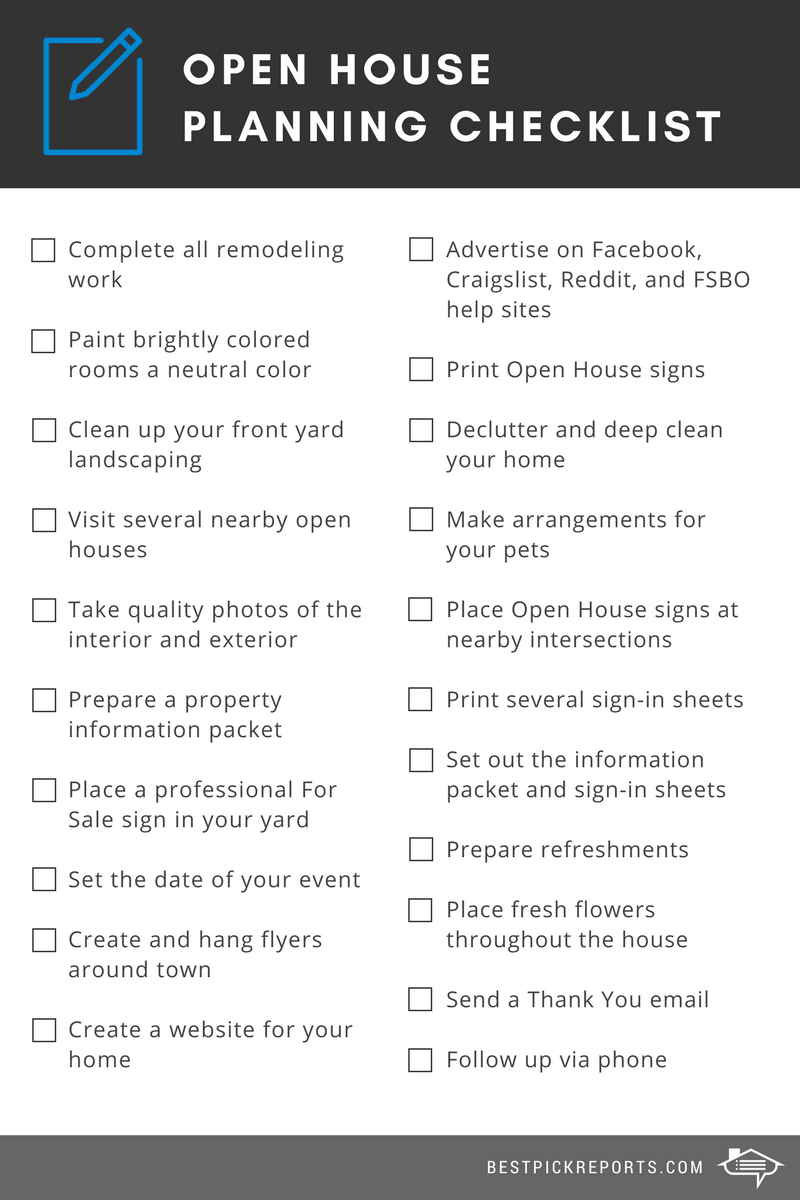Our companies are backed by the Best Pick Guarantee. Call one today!
Recently, over a series of coffee-spiked evenings, I sat down with my boyfriend to begin what will surely become a long, arduous hunt for an apartment. Between ogling shiny high-rise condos we can’t afford and debating the merits of square footage versus location, we became intimately familiar with this fact:
With home prices on the rise and the number of listings going the other way, 2017 has all the makings of a seller’s market.
People are snapping up homes with a “Quick—before it gets more expensive!” mentality, encouraging potential buyers to be flexible and act fast—bad news for my boyfriend and I (and that amazing little condo swept out from under us), good news for the industrious FSBO seller.
Of course, a favorable market isn’t all it takes to sell a home. For that, you’ll need to win buyers over with a professional, successful open house. Read on to learn how best to prepare, and refer to our printable open house checklist to keep yourself on track.

1. Do the Research
If possible, set aside a Sunday afternoon to visit a few open houses in your area.
Listen to the questions attendees ask. You’ll learn what’s important to them, and you will likely field similar questions during your open house event. Notice what the real estate agent has to say and the features they point out—it’s their job to know what appeals to buyers.
Note: Wearing your best sleuthing hat is optional, but encouraged.
2. Stage Your Home
 Depersonalizing and decluttering—a process real estate agents refer to as “staging” your home—is extremely important to making a good impression on potential buyers. The landscaping should be trimmed and inviting, and the interior should be neutral and spotlessly clean. Consider taking the following steps before putting your house on the market:
Depersonalizing and decluttering—a process real estate agents refer to as “staging” your home—is extremely important to making a good impression on potential buyers. The landscaping should be trimmed and inviting, and the interior should be neutral and spotlessly clean. Consider taking the following steps before putting your house on the market:
- Hire a landscaping company to touch up your lawn and flower beds.
- Repaint any rooms with brightly colored walls. Use a neutral, such as a soft gray, eggshell, or beige.
- Arrange furniture to optimize the size your living room or den.
- Make simple, affordable updates, such as installing new cabinet hardware and replacing old blinds.
3. Prepare a Property Summary
Buying a home is a big decision, and those in the market will want to learn everything they can about a property before deciding to invest. I cannot adequately express the frustration I experienced finding good-looking listings that failed to mention key information, like HOA fees or real estate taxes.
Those numbers matter, and knowing them from the get-go can make or break a sale. Prepare a property summary packet with the following information:
- Address
- Asking price
- Contact information
- One-paragraph description of the home
- High-quality color photos of the exterior and interior
- HOA or maintenance fees
- Real estate taxes
- Number of bedrooms and bathrooms
- Included appliances
- Special features
- Recent upgrades or remodels
- Neighborhood amenities
- School information
Print plenty of copies, and hand one out to everyone who visits the open house. Be sure to leave a stack of extras in a conspicuous place the day of the event, in case you miss someone.
4. Set a Date
When selecting the date, give yourself ample time to advertise and prepare your home for guests. Any ongoing remodeling, landscaping, or painting work should be completed well before your visitors arrive, even—perhaps especially—if you’re in rush to move. Hastily completed work is a red flag to discerning buyers.
Open houses are traditionally held on non-holiday Sundays between 1 and 4 p.m.
Once your house is ready for guests, learn when nearby homes are hosting open house by searching a real estate database site, like Zillow or Realtor.com, and take advantage of the foot traffic.
5. Get the Word Out
Advertising well is key to holding a successful open house. Tell your friends, relatives, coworkers, and neighbors you’re marketing your home; display property information sheets with the date of the event on public bulletin boards; and professionally print (or buy) a “For Sale” sign to place in your front yard.
Beyond traditional word-of-mouth methods, try the following to reach a broader audience online:
- Create a free website with a photo gallery and information about your home.
- Post about the open house on community Facebook groups as well as on your personal page. Be sure to include the link to your website.
- Advertise on FSBO help sites, craigslist.org, and community subreddits.
- Upload a walk-through tour of your home to YouTube.
On the morning of the open house, place professionally made signs at several nearby intersections to help people find your home.
6. Prepare your Home for Visitors
Think of the effort you put into making your home presentable to party guests. Now, imagine those guests considering whether or not to pay you a very large sum of money.
Catch my drift?
The level of preparation should reflect the importance of the open house event as the best opportunity to impress prospective buyers. Set yourself up for success with the following tips:
- Hire a professional house cleaning service in the week leading up to the event. If you are properly preparing in other areas, you will likely not have the time to deep clean the house yourself.
- Declutter surfaces and put away all personal items. Use the opportunity to toss items that won’t survive the move.
- Board your pets or leave them with a friend for the afternoon.
- Prepare refreshments, such as cookies and bottled water, and arrange them neatly in the kitchen.
- Place fresh flowers strategically through the house to draw the eye to your favorite features.
7. Be Professional
 This is your show. Without a real estate agent, it’s up to you to greet each visitor with a smile, point out what makes your home special without sounding pushy, and field all of their questions. (If you don’t know the answer, assure them you’ll find out and give them a call.) In addition:
This is your show. Without a real estate agent, it’s up to you to greet each visitor with a smile, point out what makes your home special without sounding pushy, and field all of their questions. (If you don’t know the answer, assure them you’ll find out and give them a call.) In addition:
- Place a simple sign-in sheet for guests to leave their name, number, and email address in the kitchen or dining room.
- Greet people at the door and thank them for coming. Give everyone a property information packet and direct them toward the registry.
- Let your guests know to tour at their leisure, and point out one or two attractive features they will want to notice as they walk through.
- Don’t be afraid to ask for feedback. Find out what your guests are looking for, if your property interests them, and how it compares to other listings they’ve seen.
8. Follow Up
The day after the open house, send an email to everyone who attended thanking them for taking the time. Keep it short and simple, and include a link to your website or online listing.
While you should not rely on follow-up calls to open a dialogue with your visitors—this is what valuable face time at the open house is for—plan to place a call to each guest within the week asking if they need any additional information.
Also inquire whether your property is still being considered. If not, ask for feedback that might make your home more attractive to potential buyers; if so, offer to schedule a private viewing.
Planning an Open House is Challenging, but Doable
Without an agent, you as the seller have complete control over pricing and scheduling, and you won’t pay any commissions—but the many aspects of selling your home, including holding an open house, require time, energy, and (worst of all) paperwork.
If you choose to brave the world of FSBO, make sure you do it right. Do your research, take staging your home seriously, and always maintain a professional attitude with potential buyers.
Remember: The market is on your side. With proper planning, your open house event will draw a number of interested parties—and you may even meet the perfect buyer.


























